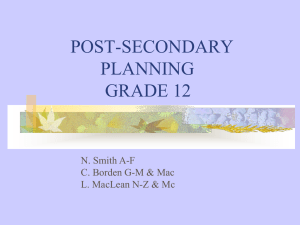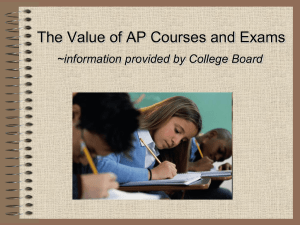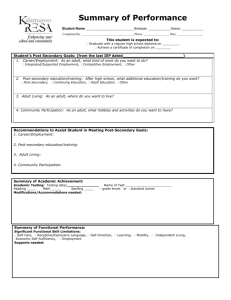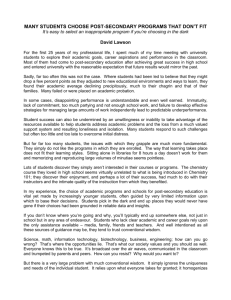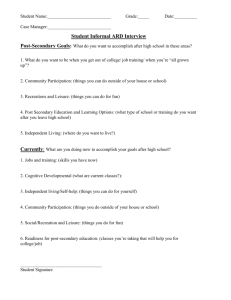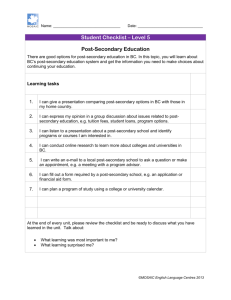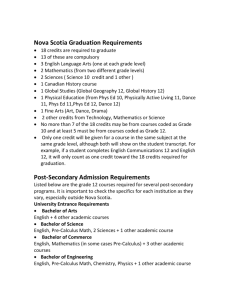Information for Graduating Students
advertisement
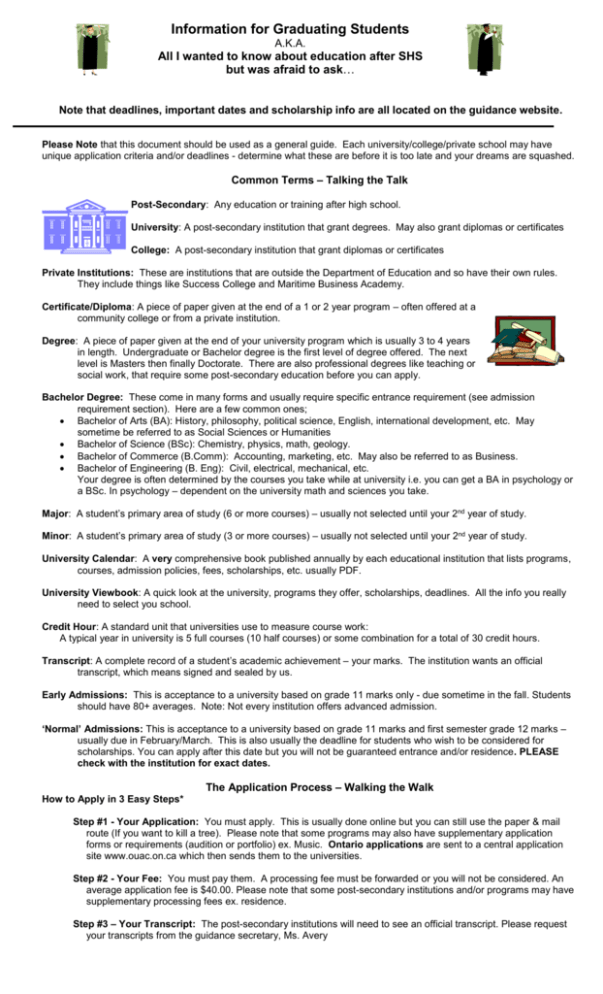
Information for Graduating Students A.K.A. All I wanted to know about education after SHS but was afraid to ask… Note that deadlines, important dates and scholarship info are all located on the guidance website. Please Note that this document should be used as a general guide. Each university/college/private school may have unique application criteria and/or deadlines - determine what these are before it is too late and your dreams are squashed. Common Terms – Talking the Talk Post-Secondary: Any education or training after high school. University: A post-secondary institution that grant degrees. May also grant diplomas or certificates College: A post-secondary institution that grant diplomas or certificates Private Institutions: These are institutions that are outside the Department of Education and so have their own rules. They include things like Success College and Maritime Business Academy. Certificate/Diploma: A piece of paper given at the end of a 1 or 2 year program – often offered at a community college or from a private institution. Degree: A piece of paper given at the end of your university program which is usually 3 to 4 years in length. Undergraduate or Bachelor degree is the first level of degree offered. The next level is Masters then finally Doctorate. There are also professional degrees like teaching or social work, that require some post-secondary education before you can apply. Bachelor Degree: These come in many forms and usually require specific entrance requirement (see admission requirement section). Here are a few common ones; Bachelor of Arts (BA): History, philosophy, political science, English, international development, etc. May sometime be referred to as Social Sciences or Humanities Bachelor of Science (BSc): Chemistry, physics, math, geology. Bachelor of Commerce (B.Comm): Accounting, marketing, etc. May also be referred to as Business. Bachelor of Engineering (B. Eng): Civil, electrical, mechanical, etc. Your degree is often determined by the courses you take while at university i.e. you can get a BA in psychology or a BSc. In psychology – dependent on the university math and sciences you take. Major: A student’s primary area of study (6 or more courses) – usually not selected until your 2nd year of study. Minor: A student’s primary area of study (3 or more courses) – usually not selected until your 2nd year of study. University Calendar: A very comprehensive book published annually by each educational institution that lists programs, courses, admission policies, fees, scholarships, etc. usually PDF. University Viewbook: A quick look at the university, programs they offer, scholarships, deadlines. All the info you really need to select you school. Credit Hour: A standard unit that universities use to measure course work: A typical year in university is 5 full courses (10 half courses) or some combination for a total of 30 credit hours. Transcript: A complete record of a student’s academic achievement – your marks. The institution wants an official transcript, which means signed and sealed by us. Early Admissions: This is acceptance to a university based on grade 11 marks only - due sometime in the fall. Students should have 80+ averages. Note: Not every institution offers advanced admission. ‘Normal’ Admissions: This is acceptance to a university based on grade 11 marks and first semester grade 12 marks – usually due in February/March. This is also usually the deadline for students who wish to be considered for scholarships. You can apply after this date but you will not be guaranteed entrance and/or residence. PLEASE check with the institution for exact dates. The Application Process – Walking the Walk How to Apply in 3 Easy Steps* Step #1 - Your Application: You must apply. This is usually done online but you can still use the paper & mail route (If you want to kill a tree). Please note that some programs may also have supplementary application forms or requirements (audition or portfolio) ex. Music. Ontario applications are sent to a central application site www.ouac.on.ca which then sends them to the universities. Step #2 - Your Fee: You must pay them. A processing fee must be forwarded or you will not be considered. An average application fee is $40.00. Please note that some post-secondary institutions and/or programs may have supplementary processing fees ex. residence. Step #3 – Your Transcript: The post-secondary institutions will need to see an official transcript. Please request your transcripts from the guidance secretary, Ms. Avery *Note: Nova Scotia Community College (NSCC) and some other private institutions have their own set of rules. For NSCC you can apply as soon as possible – the earlier the better because spaces fill up. You should check with these institutions to see what their timelines and guidelines are - www.nscc.ca. How Post Secondary Institutions (University) Decide Who to Accept Universities expect students to have at least 5 university acceptance courses at the grade 12 level. Every program has a different set of criteria for admissions. The following are typical for many universities in Atlantic Canada. Bachelor of Arts (BA): Need English 12 and four other academic grade 12 courses. Bachelor of Science (BSc): Need English 12, Pre-cal12 and three other academic grade 12 courses. Bachelor of Commerce (B.Comm): Need English 12, Academic Math 12 and three other acad. gr 12 courses. Bachelor of Engineering (B. Eng): Need English 12, Pre-cal12, Chemistry 12, Physics 12 and one other academic grade 12 courses. DANGER! Some universities might require other courses for certain programs, or may not accept some courses that are coded as academic – do your homework Calculating Admissions Averages: Most admissions averages are calculated by admission offices at the end of first semester of grade 12. Since most students have completed only 2-3 university acceptable courses at that time, they will use those and supplement them with 2-3 grade 11 marks of their choice. In addition, they often set minimum overall averages and/or minimum marks in certain courses. How Do I Decide Where to Go? Post-Secondary Day: Most Atlantic institutions will here each fall for the Education Expo. Representative Visits University and other post-secondary representatives will be visiting our school during the school year to meet with students. The dates, locations and times of these meetings will be found listed on the VGO calendar. Typically the sessions are at lunch hour. United States Universities Those students considering applying to universities in the United States should check with student services regarding the writing of the S.A.T. Reasoning Test. These tests run at different times throughout the year and require registration approximately 6 weeks in advance. The tests can be applied for online www.collegeboard.com Scholarships/Awards How to Pay for It All (Or a Least Part of It) Check out the VGO Scholarship page Universities Some post-secondary institutions do not require a special application for entrance scholarships as all students who have been admitted are automatically considered – therefore it is imperative that you apply before the stated deadline. However some do! For exceptions, please check online, in the calendar or with your guidance counsellor. Some good scholarship websites to check out: www.scholarshipscanada.com , www.studentawards.com Companies, Organization, Groups and Individuals These scholarships can often be used at any post-secondary institutions. They also usually have well laid out criteria – marks, leadership, community involvement, etc. Student Loans Student loans are loans done through a bank and the Government of Canada and usually reflect the financial need of the student. The applications do not come out until late in the year – late May. You must apply online http://studentloans.ednet.ns.ca but unlike the free money of scholarships and bursaries, you do have to pay this back (plus interest). If you don’t qualify for a student loan based on your family income, see your bank about getting a student line of credit. Resources For general admissions requirements for Atlantic Provinces universities and colleges go to www.ednet.ns.ca, then to ‘Document Depot’ and finally to ‘Career Facts Sheets and Educational Planning’. For more information about careers and post-secondary education, use the following web site: www.careercruising.com. The user name is sackvillehs and the password is careers. 2
